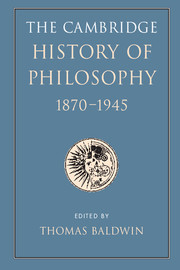Book contents
- Frontmatter
- Contents
- List of contributors
- Introduction
- I 1870–1914
- 1 Positivism, Idealism, and Pragmatism
- 2 Psychology and Philosophy
- 3 Logic, mathematics, and judgement
- 4 Philosophy and the new physics
- 5 The idea of social science
- 6 Ethics, politics, and legal theory
- 18 Utilitarians and idealists
- 19 Nietzsche
- 20 The new realism in ethics
- 21 Individualism vs. collectivism
- 22 Marxism and anarchism
- 23 Legal theory
- 7 Philosophy of religion and art
- Interlude
- II 1914–1945
- Biobibliographical appendix
- Bibliography
- INDEX
- References
21 - Individualism vs. collectivism
from 6 - Ethics, politics, and legal theory
Published online by Cambridge University Press: 28 March 2008
- Frontmatter
- Contents
- List of contributors
- Introduction
- I 1870–1914
- 1 Positivism, Idealism, and Pragmatism
- 2 Psychology and Philosophy
- 3 Logic, mathematics, and judgement
- 4 Philosophy and the new physics
- 5 The idea of social science
- 6 Ethics, politics, and legal theory
- 18 Utilitarians and idealists
- 19 Nietzsche
- 20 The new realism in ethics
- 21 Individualism vs. collectivism
- 22 Marxism and anarchism
- 23 Legal theory
- 7 Philosophy of religion and art
- Interlude
- II 1914–1945
- Biobibliographical appendix
- Bibliography
- INDEX
- References
Summary
INTRODUCTION
In Britain, the period from 1870 to 1914 was one of a general movement, both in politics and in philosophical reflection on it, from individualism to collectivism (Collini 1979: ch. 1; Gaus 1983: ch. 1; Greenleaf 1983; Bellamy 1992: ch. 1). These are loose and disputed terms (M. Taylor 1996). Roughly, individualism meant leaving the individual as free as possible to pursue his own interests as he saw fit, society being simply a collection of individuals and a means to their ends. Collectivism was more or less the opposite, holding that individuals are not isolated atoms but social beings with shared interests, and that society may act through the state to promote them. Collectivism ranged in degree from occasional government action to effect particular social reforms, to state socialism’s control of the means of production and restructuring of society.
The dominant political theory, Liberalism, adapted itself to the new political conditions. Earlier in the nineteenth century, Liberalism had sought to maximise individual freedom and assumed that this entailed minimising state action. It restricted state action to what was unavoidable because all state action was by its very nature an interference with individual liberty and therefore intrinsically bad, and also bad in its effects, especially by reducing individuals' self-reliance. But later many Liberals accepted state action. They realised that for most individuals freedom from interference was worthless because they lacked the means to utilise it. State action could secure those means, and thus was not necessarily opposed to individual liberty.
- Type
- Chapter
- Information
- The Cambridge History of Philosophy 1870–1945 , pp. 289 - 296Publisher: Cambridge University PressPrint publication year: 2003



